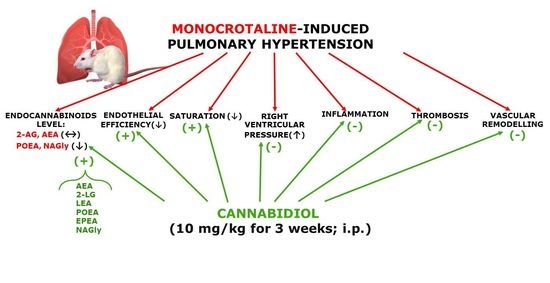
“Cannabigerol (CBG) is a cannabinoid compound that is synthesized from Cannabis sativa L. and acts as a substrate for both Δ9-tetraydrocannabinol (Δ9-THC) and cannabidiol (CBD) formation. Given that it does not exhibit psychoactive effects, emerging research has focused on CBG as a potential therapeutic for health conditions including algesia, epilepsy, anxiety, and cancer. While CBG can bind to cannabinoid receptors CB1 and CB2, it has also been described as an agonist at α2-adrenoreceptors (A2-AR), which when activated inhibit the release of norepinephrine from α-adrenergic neurons. This raises the concern that CBG could act at A2-AR to reduce norepinephrine release to cardiovascular end organs, such as the heart and kidneys, causing a reduction in blood pressure. Despite this possibility, there are no reports examining cardiovascular effects of CBG. In this study, we tested the hypothesis that acute CBG administration can lower blood pressure. To test this, six male C57BL/6J mice underwent surgery at 8-10 weeks of age to implant a radiotelemetry probe, which allows for continuous measurement of blood pressure, heart rate and locomotor activity in conscious, freely moving mice. Following 10 days of recovery, baseline measurements were obtained and then mice were randomized to receive intraperitoneal injections of CBG (3.3, 5.6, and 10 mg/kg) and vehicle in a crossover design, with at least one-week washout between treatments. Changes in blood pressure, heart rate, and locomotor activity were measured for two hours post-injection. We found that acute CBG significantly lowered blood pressure compared with vehicle (-12±5 mmHg vehicle vs. -28±2 mmHg at 10 mg/kg CBG; p=0.018), with no apparent dose responsiveness at the doses used in this study (-22±2 mmHg at 3.3 mg/kg CBG; -28±4 at 5.6 mg/kg CBG). The greatest blood pressure reduction was seen at 90-minutes post-CBG administration, which is consistent with reports for peak plasma concentrations of this compound in rodents. The blood pressure lowering effects of CBG occurred in the absence of changes in heart rate or locomotor activity. These overall findings suggest acute CBG may lower blood pressure in phenotypically normal young adult male mice, which may provide caution for the potential of hypotension as an adverse effect of CBG administration. Additional studies are needed to determine if the blood pressure lowering effects of CBG are via an A2-AR mechanism.”
https://pubmed.ncbi.nlm.nih.gov/35555999/
https://faseb.onlinelibrary.wiley.com/doi/10.1096/fasebj.2022.36.S1.0R576


 “The Endocannabinoid System (ECS) is primarily responsible for maintaining homeostasis, a balance in internal environment (temperature, mood, and immune system) and energy input and output in living, biological systems.
“The Endocannabinoid System (ECS) is primarily responsible for maintaining homeostasis, a balance in internal environment (temperature, mood, and immune system) and energy input and output in living, biological systems.  “Proteins from hemp bran (HPB), a byproduct of the hemp seed food-processing chain, were chemically extracted, hydrolyzed by Alcalase, and separated by membrane ultrafiltration into four fractions (MW <1, 1-3, 3-5, and >5 kDa).
“Proteins from hemp bran (HPB), a byproduct of the hemp seed food-processing chain, were chemically extracted, hydrolyzed by Alcalase, and separated by membrane ultrafiltration into four fractions (MW <1, 1-3, 3-5, and >5 kDa). 
 “Background: Medical cannabis use is increasing rapidly in the past several years, with older adults being the fastest growing group. Nevertheless, the evidence for cardiovascular safety of cannabis use is scarce. The aim of this study was to assess the effect of cannabis on blood pressure, heart rate, and metabolic parameters in older adults with hypertension.
“Background: Medical cannabis use is increasing rapidly in the past several years, with older adults being the fastest growing group. Nevertheless, the evidence for cardiovascular safety of cannabis use is scarce. The aim of this study was to assess the effect of cannabis on blood pressure, heart rate, and metabolic parameters in older adults with hypertension.
 “Neuroinflammation in the rostral ventrolateral medulla (RVLM) has been reported to be associated with hypertension. The upregulation and activation of the
“Neuroinflammation in the rostral ventrolateral medulla (RVLM) has been reported to be associated with hypertension. The upregulation and activation of the  “Excessive activation of the sympatho-adrenomedullary system plays a pathogenic role in triggering and sustaining essential hypertension. We previously reported that, in normotensive rats, intracerebroventricularly (i.c.v.) administered neuropeptides, corticotropin-releasing factor and bombesin induced activation of the sympatho-adrenomedullary system, and that brain
“Excessive activation of the sympatho-adrenomedullary system plays a pathogenic role in triggering and sustaining essential hypertension. We previously reported that, in normotensive rats, intracerebroventricularly (i.c.v.) administered neuropeptides, corticotropin-releasing factor and bombesin induced activation of the sympatho-adrenomedullary system, and that brain  “In vivo studies show that
“In vivo studies show that 